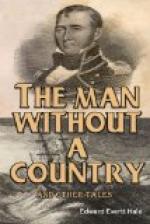“There was his palace, in
the deep waters of the seas,
Shining with gold, and builded forever.
There he yoked him his swift-footed horses;
Their hoofs are brazen, and their manes are golden.
He binds them with golden thongs,
He seizes his golden goad,
He mounts upon his chariot, and doth fly:
Yes! he drives them forth into the waves!
And the whales rise under him from the depths,
For they know he is their king;
And the glad sea is divided into parts,
That his steeds may fly along quickly;
And his brazen axle passes dry between the waves,
So, bounding fast, they bring him to his Grecians."[C]
And the poets sank again into talk.
“You see it,” said the old Philistine. “He paints the picture. David sings the life of the picture.”
“Yes: Homer sees what he sings; David feels his song.”
“Homer’s is perfect in its description.”
“Yes; but for life, for the soul of the description, you need the Hebrew.”
“Homer might be blind; and, with that fancy and word-painting power of his, and his study of everything new, he would paint pictures as he sang, though unseen.”
“Yes,” said another; “but David—” And he paused.
“But David?” asked the chief.
“I was going to say that he might be blind, deaf, imprisoned, exiled, sick, or all alone, and that yet he would never know he was alone; feeling as he does, as he must to sing so, of the presence of this Lord of his!”
“He does not think of a snow-flake, but as sent from him.”
“While the snow-flake is reminding Homer of that hard, worrying, slinging work of battle. He must have seen fight himself.”
They were hushed again. For, though they no longer dared ask the poets to sing to them,—so engrossed were they in each other’s society,—the soldiers were hardly losers from this modest courtesy. For the poets were constantly arousing each other to strike a chord, or to sing some snatch of remembered song. And so it was that Homer, apropos of I do not know what, sang in a sad tone:—
“Like leaves on trees
the race of man is found,
Now green in youth, now withering
on the ground:
Another race the following
spring supplies;
They fall successive, and
successive rise.
So generations in their course
decay,
So flourish these, when those
have passed away."[D]
David waited for a change in the strain; but Homer stopped. The young Hebrew asked him to go on; but Homer said that the passage which followed was mere narrative, from a long narrative poem. David looked surprised that his new friend had not pointed a moral as he sang; and said simply, “We sing that thus:—
“As for man, his days are
as grass;
As a flower of the field, so he flourisheth;
For the wind passeth over it, and it is gone,
And the place thereof shall know it no more.
But the mercy of the Lord
Is from everlasting to everlasting
Of them that fear him;
And his righteousness
Unto children’s children,
To such as keep his covenant,
As remember his commandments to do them!”




